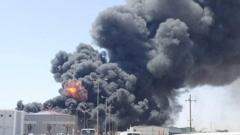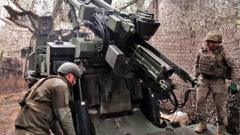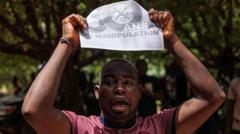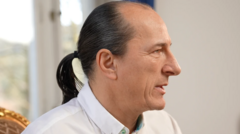Niger's military ruler, General Abdourahamane Tchiani, has been inaugurated as the president of the country for a transitional period of five years following a coup that overthrew the elected leader two years ago.
Niger's Military Leader Assumes Presidency Amid Transitional Chaos
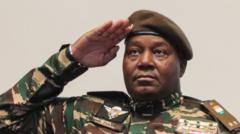
Niger's Military Leader Assumes Presidency Amid Transitional Chaos
Niger's newly sworn president, General Abdourahamane Tchiani, outlines plans for a five-year military rule.
In a significant shift in governance, General Tchiani has officially been sworn in, marking a new chapter in Niger's political landscape. The ceremony took place in the capital, Niamey, where General Tchiani emphasized his commitment to uphold the responsibilities of the presidency. This transition comes after the dissolution of political parties and the introduction of a new charter that effectively replaces the previous constitution.
General Tchiani's rise to power began in 2023 when he deposed former President Mohamed Bazoum. In conjunction with his presidential appointment, he was elevated to the highest military rank of army general. His administration has faced challenges, notably Niger's ongoing struggles with jihadist violence; issues the junta has consistently referenced to justify their coup.
The five-year transition to democratic governance is described as "flexible," suggesting that the timeline may shift based on security conditions in the country. The West African region has witnessed a wave of military coups, including in neighboring Mali, Guinea, and Burkina Faso, all of which share similar governance structures under military rule. These countries have distanced themselves from former colonial power France and are pivoting towards new alliances, notably with Russia.
Niger's strained relationship with the Economic Community of West African States (Ecowas) stems from disputes over the duration of the transition period proposed by the junta. Initially, Ecowas issued threats of military intervention in response to the junta's three-year recovery plan but later toned down its stance.
Within this shifting political climate, General Tchiani's administration has initiated legal proceedings against former President Bazoum, accusing him of high treason. Bazoum continues to be held under strict conditions, while his family members face varying circumstances regarding their freedom.
General Tchiani concluded the inaugural ceremony by asserting that the new charter reflects traditional governance while implementing novel measures aimed at ensuring Niger's natural resources benefit its citizens. As the international community watches closely, the questions remain: Will this military-led government successfully stabilize the tumultuous region, or are further upheavals on the horizon?
For more on Niger's evolving political dynamics, keep following our updates.
General Tchiani's rise to power began in 2023 when he deposed former President Mohamed Bazoum. In conjunction with his presidential appointment, he was elevated to the highest military rank of army general. His administration has faced challenges, notably Niger's ongoing struggles with jihadist violence; issues the junta has consistently referenced to justify their coup.
The five-year transition to democratic governance is described as "flexible," suggesting that the timeline may shift based on security conditions in the country. The West African region has witnessed a wave of military coups, including in neighboring Mali, Guinea, and Burkina Faso, all of which share similar governance structures under military rule. These countries have distanced themselves from former colonial power France and are pivoting towards new alliances, notably with Russia.
Niger's strained relationship with the Economic Community of West African States (Ecowas) stems from disputes over the duration of the transition period proposed by the junta. Initially, Ecowas issued threats of military intervention in response to the junta's three-year recovery plan but later toned down its stance.
Within this shifting political climate, General Tchiani's administration has initiated legal proceedings against former President Bazoum, accusing him of high treason. Bazoum continues to be held under strict conditions, while his family members face varying circumstances regarding their freedom.
General Tchiani concluded the inaugural ceremony by asserting that the new charter reflects traditional governance while implementing novel measures aimed at ensuring Niger's natural resources benefit its citizens. As the international community watches closely, the questions remain: Will this military-led government successfully stabilize the tumultuous region, or are further upheavals on the horizon?
For more on Niger's evolving political dynamics, keep following our updates.



